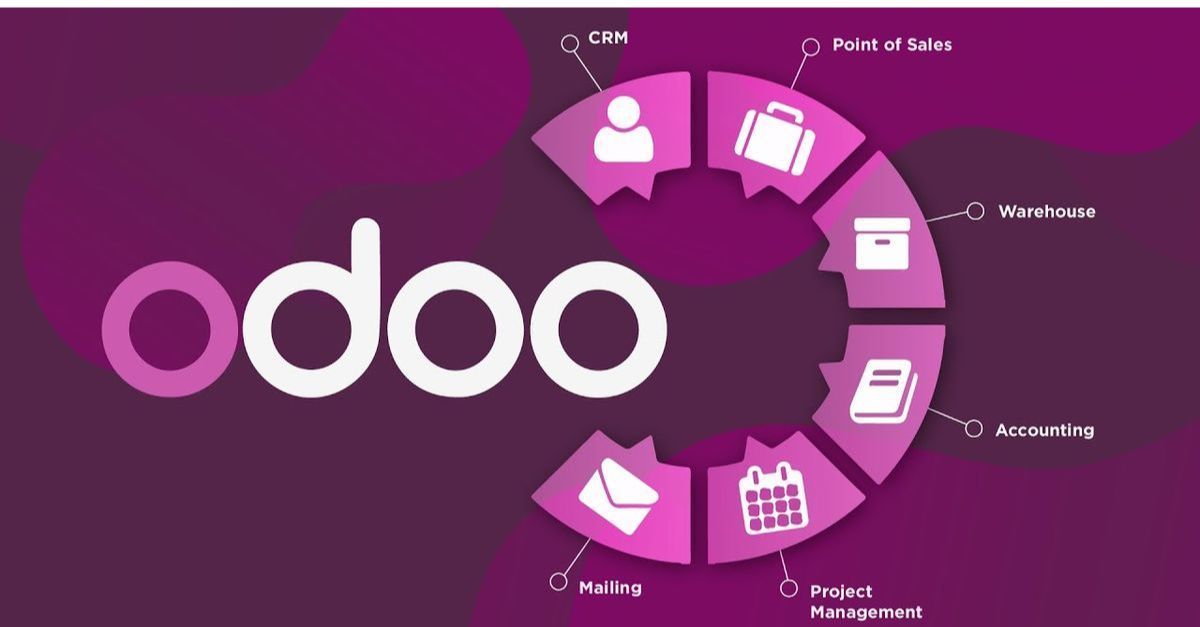Odoo ERP - Overview
January 7, 2025
What is Odoo?
This ERP system offers various business management solutions and functions, such as:
Customer Relationship Management (CRM), e-commerce, accounting, manufacturing, warehousing, project management, and inventory management. Odoo has around 30 core applications and over 20,000 modules. The Belgian company has a digital community of over 1,500 users and a strong global partner network.
Advantage: Here are some of the differences between Odoo and other ERP systems on the market: - One of the best for small businesses
Market focus:
Odoo is a leading ERP provider focused on small and medium-sized businesses.
Cross-industry: The system supports multiple vertical businesses. Some of the most notable Odoo customers include: Toyota, CSC Scientific, SoftIron, Nordika and many others.
User Interface: Odoo has a simple user environment and very intuitive programming. Our customers find it easy to train their teams and receive positive feedback on the user interface.
Flexibility: Integrations, applications, and additional functionality can be added over time, while many other ERP systems require a specific set of technologies to implement. Odoo is more modular and can be built to fit specific digital transformation strategies or evolving initiatives.
Pricing Transparency: Pricing is very straightforward and clear throughout the entire purchasing process with very few hidden costs - ideal for small and medium-sized businesses on a tight budget. Failure: Odoo is very sensible in terms of ERP system, so it is so attractive to communities of small and medium -sized enterprises.
Compatibility
- Supplement with other systems: due to its structure, Odoo usually accompanies other systems and improves overall business productivity. For example, if an organization has an existing ERP but needs CRM support - Odoo CRM can be integrated with their existing system while allowing CRM functionality without having to replace the entire ERP suite.
API Friendly:
Odoo can be effectively integrated with other major systems, most notably: Amazon, eBay, UPS/FedEx and QuickBooks. - implement:
Slow and steady: Odoo allows organizations to grow and evolve with the software instead of implementing an overwhelming solution that a business will find difficult to manage. Modules, apps, and features can be added throughout the business transformation process and can evolve as your digital strategy evolves.
Ease of Execution:
Because of the product’s relative ease of use and technical simplicity, it can be easier, less costly, and less risky to implement than other ERP systems.

In today’s fast-paced business world, Enterprise Resource Planning (ERP) software has become the backbone of organizations, helping streamline operations, reduce inefficiencies, and improve decision-making. Odoo has emerged as a global leader in modular ERP solutions, offering flexibility and scalability across industries. However, in regions like India and the Middle East, Odoo faces strong competition from local and international players such as ERPNext, TallyPrime, Zoho One, SAP Business One, and Compass ERP. This blog explores a detailed comparison of Odoo with these competitors, focusing on features, strengths, and regional suitability to help businesses make the right choice Odoo – The Benchmark ERP Odoo is an open-source, modular ERP platform that offers more than 40 integrated applications covering accounting, CRM, e-commerce, HR, manufacturing, inventory, and more. With both Community (free) and Enterprise (paid) editions, Odoo is highly flexible and can be customized extensively. Strengths Modular approach – businesses can start small and scale. Strong developer community with global adoption. Affordable compared to global giants like SAP or Oracle. Cloud, on-premise, and hybrid deployment options. Limitations Customization may require technical expertise. Enterprise support can be expensive for SMEs. Odoo’s adaptability makes it a strong fit for growing SMEs in India and digitally transforming enterprises in the Middle East. Odoo’s adaptability makes it a strong fit for growing SMEs in India and digitally transforming enterprises in the Middle East. ERPNext – The Indian Open-Source Challenger ERPNext, developed by Frappe Technologies (India), is often called the “Indian alternative to Odoo.” Like Odoo, it is open-source and modular, covering accounting, HR, inventory, projects, and CRM. Strengths Clean, user-friendly interface. Strong support for Indian compliance (GST, TDS). Lower cost of ownership compared to Odoo. Active open-source community. Limitations Smaller ecosystem compared to Odoo. Limited large-scale enterprise adoption. India vs. Middle East Fit In India, ERPNext is popular among startups and SMEs that want open-source flexibility without Odoo’s complexity. In the Middle East, adoption is slower as businesses prefer solutions with multilingual support and stronger enterprise backing. TallyPrime – The Accounting Powerhouse TallyPrime is the successor of Tally ERP, developed by Tally Solutions (India). It is primarily an accounting and compliance-focused ERP with basic inventory and business management features. Strengths Deep penetration in India with a loyal user base. Excellent GST and taxation compliance. Simple and reliable for accounting-driven businesses. Low training curve for accountants. Limitations Limited beyond accounting and inventory. Not ideal for businesses requiring advanced ERP modules (manufacturing, CRM, HR). Outdated UI compared to modern ERPs. India vs. Middle East Fit In India, TallyPrime remains a favorite for SMEs with basic ERP needs and compliance-heavy operations. In the Middle East, it lacks traction due to limited multi-currency, multilingual, and industry-specific features. Zoho One – The All-in-One Suite Zoho One, developed by Zoho Corporation (India/Global), is a suite of over 40 cloud-based applications that include CRM, HR, finance, helpdesk, and collaboration tools. Strengths Cloud-native with seamless integrations. Affordable subscription pricing. Strong CRM and collaboration tools. Quick to implement, low technical overhead. Limitations Limited deep ERP functionality for manufacturing and supply chain. Customization options less extensive compared to Odoo. India vs. Middle East Fit In India, Zoho One appeals to SMEs looking for cloud-first business management without heavy ERP investments. In the Middle East, Zoho’s growing presence is fueled by cloud adoption trends and multilingual support. SAP Business One – The Enterprise-Grade Contender SAP Business One is SAP’s ERP tailored for small and mid-sized enterprises. It offers modules for finance, sales, inventory, manufacturing, and supply chain, with both cloud and on-premise deployment. Strengths Global brand recognition and trust. Robust functionality with scalability. Strong partner and support network in both India and the Middle East. Industry-specific solutions. Limitations Higher cost compared to Odoo, ERPNext, or Zoho. Longer implementation cycles. India vs. Middle East Fit In India, SAP B1 is popular among mid-to-large enterprises aiming for global best practices. In the Middle East, SAP has a strong foothold, especially in oil, construction, and logistics industries. Compass ERP – The Middle Eastern Specialist Compass ERP, developed by Transtek Systems (UAE), is a bilingual ERP system offering modules for finance, HR, CRM, inventory, and procurement. Strengths Bilingual support (Arabic & English). Strong localization for Middle Eastern regulations. Established customer base in UAE, KSA, and GCC markets. Limitations Limited brand recognition outside the Middle East. Smaller global ecosystem compared to Odoo or SAP. India vs. Middle East Fit In India, Compass ERP has minimal presence. In the Middle East, it’s a strong contender due to Arabic support and regional compliance features. Conclusion: Which ERP Should You Choose? For SMEs in India → ERPNext, TallyPrime, or Zoho One may be the most cost-effective choices, with Odoo for those needing scalability. For Enterprises in India → SAP Business One or Odoo are stronger candidates depending on budget and customization needs. For SMEs in the Middle East → Odoo, Zoho One, or Compass ERP provide the right balance of flexibility and localization. For Enterprises in the Middle East → SAP Business One remains the most trusted, while Odoo is a growing alternative with strong customization potential. Ultimately, the decision depends on business size, industry, compliance needs, and budget. Odoo’s modularity makes it versatile, but regional competitors like ERPNext in India and Compass ERP in the Middle East show that localization often wins over global standardization.

India is witnessing a remarkable digital transformation—especially among its MSMEs. Spearheading this change is Odoo , the Belgian open-source ERP platform, whose expanded presence in India is rewriting the playbook for enterprise software adoption. 1. Record-Breaking Community Engagement The crescendo of Odoo’s India expansion was its Odoo Community Days 2025, which attracted over 25,000 participants at Gandhinagar’s Mahatma Mandir on August 13–14, setting a new benchmark in business-software community events. This included not just attendees—but a visionary 24-hour hackathon preceding the main event that earned entries in both the India Book of Records and the Asia Book of Records, with 18,000 registrations, 8,800 virtual contenders, and 1,000 finalists demonstrating the platform’s mass appeal. Beyond size, the event was soulfully driven by Odoo employees—from logistics to programming—highlighting the company’s community-centric philosophy and operational capability. Notably, CEO Fabien Pinckaers and Odoo India MD Mantavya Gajjar engaged directly with stakeholders via panels and exclusive interactions, reinforcing their long-term commitment to the Indian market. 2. Exponential Market Penetration Odoo’s influence in India has grown rapidly. As of Q2 2025, there are 5,381 active Odoo-powered stores, marking an astounding 163% year-over-year growth. This surge speaks not merely to software adoption—but the shift of both retailers and service providers toward integrated, affordable ERP platforms. 3. A Platform Tailored for India’s Needs Several factors make Odoo ideally suited for India’s diverse and fast-evolving business landscape: Open-source affordability : Odoo offers a free community version, with cost-effective enterprise upgrades—an attractive alternative to expensive legacy ERPs. Modular design: Businesses can adopt features gradually—from CRM and eCommerce to accounting and inventory—scaling as they grow. Customizable & extensible: A burgeoning ecosystem of Indian developers enables tailored workflows, local integrations, and regional compliance. Alignment with national initiatives: Odoo aids India’s Digital India and Make in India goals with cloud-ready, mobile-friendly solutions—perfect for MSMEs on a digitization path. 4. Thriving Ecosystem of Partners and Talent - The ecosystem behind Odoo in India is equally impressive: Multiple recognized Gold Partners—such as Oodo Implementers—have executed large implementations across industries, including government projects, and received global recognition. A large pool of skilled consultants and freelancers offers services ranging from setup to customization, further widening adoption. Demand for services is evident—developers offer GST-compliant setups, e-invoicing, and Odoo configuration tailored to Indian fiscal norms. However, user feedback reveals mixed experiences with support quality and onboarding effectiveness—particularly in small businesses—highlighting areas for ecosystem maturity.. 5. Driving Business Value Across Sectors Indian businesses across sectors have begun leveraging Odoo to streamline operations: Manufacturing & Retail: Integrated modules manage inventory, ERP, POS, and eCommerce from one unified platform . Healthcare & Education: Custom modules facilitate scheduling, records, billing, and admissions management. SMEs: Odoo reduces costs, centralizes operations, and replaces fragmented tools, enabling better decision-making and process visibility . Conclusion From a modest open-source ERP to India’s fastest-growing enterprise platform, Odoo has made extraordinary inroads. Its inclusive, modular, and affordable model aligns with India’s vast MSME aspirations, while its localized ecosystem—developers, partners, and events—fosters deep adoption. If Odoo can scale support, automation, and ecosystem oversight, the future certainly looks bright—for both business users and Odoo itself


